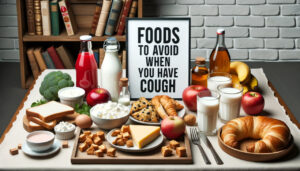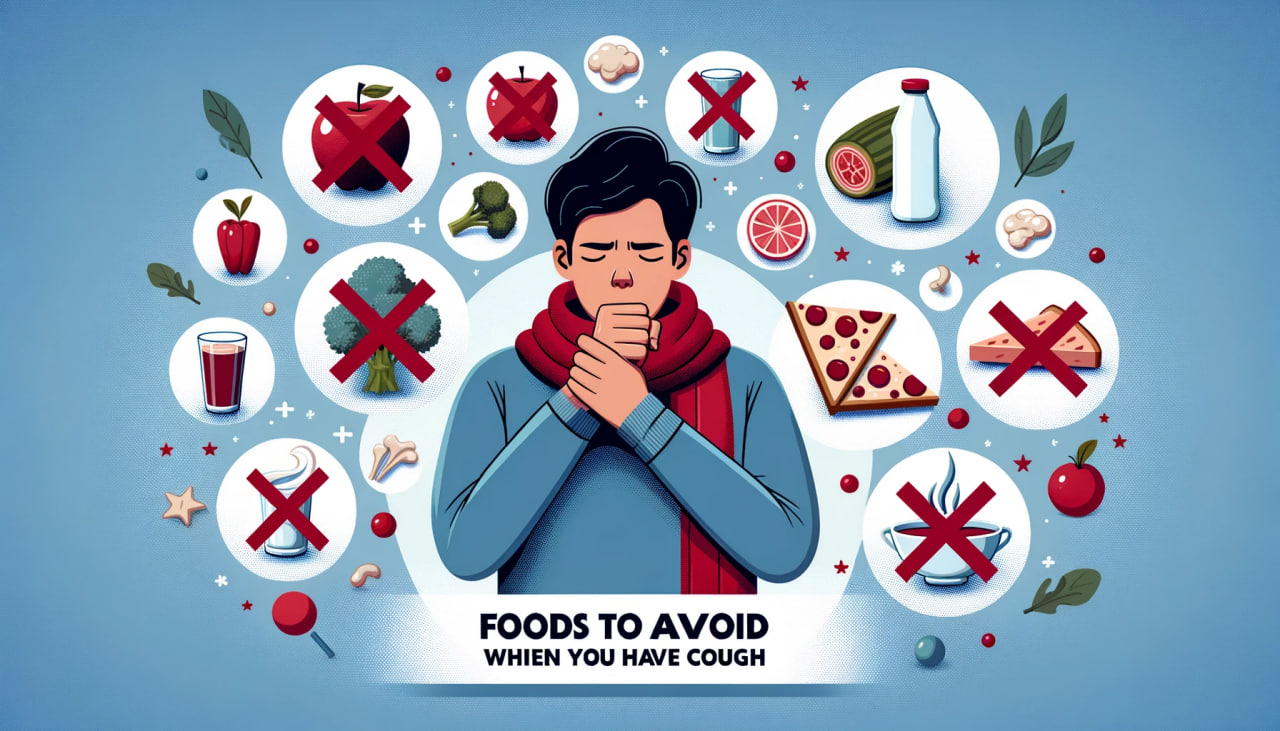Introduction
Coughing is a common symptom of various health conditions, such as colds, allergies, and respiratory infections. It can be bothersome and disruptive to our daily lives, especially when it lingers for an extended period. While there are various remedies and medications available to relieve coughing, did you know that the foods we consume can also have an impact on our cough? In this blog post, we will discuss foods that may exacerbate coughing and should be avoided when dealing with this irritating symptom. So, if you’re battling a cough, keep reading to find out which foods you should avoid.
Understanding The Link Between Diet and Cough
Our diet significantly affects our overall health and well-being, including managing cough symptoms. When it comes to coughing, certain foods can worsen the condition and prolong the recovery process. Understanding the link between diet and cough is crucial to making informed choices about our consumption.
Research suggests certain foods can trigger coughing or irritate the throat, making the symptoms more severe. These foods typically include spicy or acidic options, such as citrus fruits, tomatoes, and spicy peppers. Additionally, dairy products like milk and cheese may contribute to mucus production and increase coughing.
It is important to note that everyone’s body reacts differently to various foods, so paying attention to your triggers and making dietary adjustments accordingly is essential. Being mindful of your diet and avoiding foods exacerbating coughing can alleviate symptoms and promote a faster recovery.
Foods That May Worsen Your Cough
When dealing with a cough, it’s essential to be mindful of the foods you consume, as some can worsen your symptoms. Certain foods have been known to trigger coughing or irritate the throat, making the symptoms more severe and persistent. Common culprits are spicy or acidic options, such as citrus fruits, tomatoes, and spicy peppers. Dairy products like milk and cheese can also produce mucus and increase coughing. It’s worth noting that everyone’s body reacts differently to different foods, so paying attention to your triggers is essential. By avoiding foods that exacerbate your cough, you can potentially alleviate symptoms and promote a faster recovery. Stay tuned for more tips on managing your diet while dealing with a cough.
Exploring Alternative Food Choices for a Soothing Throat
When dealing with a cough, finding alternative food choices to help soothe your throat can make a big difference in your comfort level. Instead of consuming foods that may exacerbate your symptoms, there are plenty of options that can provide relief and promote healing.
One great choice is honey. Known for its soothing properties, love can help soothe a sore throat and calm coughing. Mix it with warm water or herbal tea for a relaxing beverage, or consume it directly from a spoon. Another option is broth-based soups, which can provide hydration and warmth to your throat. Adding ingredients like ginger or garlic can further enhance the throat-soothing benefits.
If you’re in the mood for a snack, choose softer options like yogurt or smoothies made with fruits and vegetables. These foods are gentle on the throat and can provide essential nutrients for recovery. Finally, consider incorporating foods high in vitamin C, such as oranges or strawberries, as they can boost your immune system and help fight off the underlying cause of your cough.
By exploring these alternative food choices for a soothing throat, you can find comfort while dealing with a cough, potentially aiding your recovery.
Drinks to Avoid When You Have a Cough
When you cough, it’s not just the foods you eat that can worsen your symptoms but also the drinks you consume. Certain beverages can irritate your throat, increase mucus production, or cause further inflammation, prolonging your cough and discomfort. So, being mindful of what you drink when dealing with a cough is essential.
First and foremost, it’s best to avoid caffeinated drinks such as coffee and black tea. Caffeine can dehydrate your body and irritate your throat, making your cough more persistent. Alcohol should also be avoided, as it can cause dehydration and further irritate your throat.
Carbonated drinks like soda or sparkling water may seem refreshing, but the carbonation can aggravate your cough and make breathing harder. Sugary drinks should also be avoided, as they can weaken your immune system and prolong your recovery.

Instead, opt for soothing and hydrating drinks such as warm herbal tea, plain water, or warm lemon water with honey. These can help soothe your throat and provide relief from coughing. Remember to stay hydrated and listen to your body when choosing beverages while dealing with a cough.
Practical Tips for Eating Right While Dealing With a Cough
When managing your diet while dealing with a cough, you can follow a few practical tips to ensure you’re eating right and supporting your recovery. Firstly, staying hydrated by drinking plenty of fluids throughout the day is essential. Water, herbal teas, and warm lemon water with honey are all excellent choices to soothe your throat and relieve coughing.
Additionally, incorporating foods rich in vitamins and minerals can help strengthen your immune system and aid in your recovery. Fruits and vegetables high in vitamin C, such as oranges and strawberries, can boost your immune system. Foods like garlic and ginger, known for their anti-inflammatory properties, can also help reduce inflammation in your throat.
Another tip is to opt for smaller, more frequent meals rather than large, heavy ones. Eating smaller portions can prevent your stomach from putting pressure on your diaphragm, which can trigger coughing fits.
Lastly, listening to your body and being mindful of your symptoms can guide you in making dietary adjustments. If certain foods seem to exacerbate your cough, try eliminating them from your diet temporarily to see if your symptoms improve.
By following these practical tips for eating right while dealing with a cough, you can provide your body with the nourishment it needs and potentially speed up your recovery process.
Herbs and Spices to Ease Cough Symptoms
Incorporating herbs and spices into your diet can relieve and help ease your symptoms when dealing with a persistent cough. Certain herbs and spices have properties that can soothe the throat and reduce coughing.
One popular herb for cough relief is thyme. Thyme contains compounds that act as expectorants, helping to loosen mucus and ease congestion. For a soothing beverage, you can brew thyme tea by steeping fresh or dried thyme leaves in hot water.
Another beneficial herb is ginger. Ginger has anti-inflammatory properties that can help reduce throat irritation and calm coughing. You can add grated ginger to warm water or herbal tea or even incorporate it into your meals for added flavor and relief.
Turmeric, known for its anti-inflammatory and antioxidant properties, can help alleviate cough symptoms. You can add turmeric powder to warm milk or incorporate it into soups and stews for a comforting and healing effect.
By incorporating herbs and spices like thyme, ginger, and turmeric into your diet, you can find natural relief for your cough symptoms and support your body’s healing process.
Managing Your Diet When You Have a Cough
Managing your diet when you have a cough is crucial to supporting your body’s healing process and alleviating symptoms. Firstly, it’s essential to prioritize hydration by drinking plenty of fluids throughout the day. Water, herbal teas, and warm lemon water with honey are all excellent choices to soothe your throat and relieve coughing.
In addition to hydration, incorporating foods rich in vitamins and minerals can strengthen your immune system and aid your recovery. Fruits and vegetables high in vitamin C, such as oranges and strawberries, can provide a much-needed boost. Foods like garlic and ginger, known for their anti-inflammatory properties, can also help reduce inflammation in your throat.
Another tip is to opt for smaller, more frequent meals rather than large, heavy ones. Eating smaller portions can prevent your stomach from putting pressure on your diaphragm, which can trigger coughing fits.
Lastly, listening to your body and being mindful of your symptoms can guide you in making dietary adjustments. If certain foods exacerbate your cough, try temporarily eliminating them from your diet to see if your symptoms improve.
By managing your diet in these ways, you can provide your body with the nourishment it needs and potentially speed up your recovery process.
Mindful Snacking to Alleviate Coughing Discomfort
When dealing with a cough, finding ways to alleviate discomfort and soothe your throat is essential. Mindful snacking can be a great way to achieve this while providing nourishment to support your recovery. Instead of reaching for unhealthy snacks that can exacerbate your symptoms, opt for options that are gentle on the throat and provide relief.
One excellent snack choice is sliced bananas with a drizzle of honey. Bananas are soft and easy to swallow, while love can help soothe a sore throat. Another option is applesauce, which is smooth and can provide hydration. Additionally, you can try munching on cucumber slices or carrot sticks, which are refreshing and packed with nutrients.
Remember to chew your snacks slowly and mindfully, savoring each bite and allowing yourself to experience the flavors thoroughly. By choosing these mindful snack options, you can comfort your throat and potentially ease coughing discomfort.
Soothing Soups for Cough Relief
When you cough, soothing soups can be a comforting and nourishing option to provide relief. Not only do they help to keep you hydrated, but they can also help to soothe your throat and alleviate coughing discomfort.
Many different types of soups can be beneficial for cough relief. One popular choice is chicken soup, which has been touted for its healing properties for centuries. The warm broth can help to loosen mucus and provide hydration, while the chicken provides essential nutrients for your body.
Another great option is vegetable soup, packed with vitamins and minerals to support your immune system. You can add ingredients like ginger or garlic to enhance the anti-inflammatory properties and further soothe your throat.
Consider potato soup or butternut squash soup if you want a creamier option. These soups are easy to swallow and can provide a comforting sensation to your throat.
Incorporating soothing soups into your diet can be a delicious and effective way to relieve coughing discomfort. Whether you opt for chicken soup, vegetable soup, or a creamy option, choose ingredients that are gentle on your throat and promote healing.
Sleep and Rest: Importance in Recovery from Cough
Getting enough sleep and rest is crucial when recovering from a cough. Rest allows your body to conserve energy and focus on fighting off the underlying cause of your cough. During sleep, your body repairs and rejuvenates, which can aid in the healing process.
When you cough, it can be challenging to get a good night’s sleep due to the constant coughing and discomfort. However, it’s important to prioritize rest and create an environment that promotes sleep. This includes keeping your bedroom cool, dark, and quiet and establishing a regular sleep schedule.
If your cough keeps you awake at night, try propping yourself up with pillows or using a humidifier to add moisture to the air. Additionally, you can try natural remedies such as drinking warm herbal tea or taking a warm bath before bed to help relax your body.
By prioritizing sleep and rest, you can support your body’s recovery process and potentially alleviate coughing symptoms. So, create a sleep-friendly environment and give your body the rest it needs to heal.


Your point of view caught my eye and was very interesting. Thanks. I have a question for you.
I don’t think the title of your article matches the content lol. Just kidding, mainly because I had some doubts after reading the article.
Regards for this wonderful post, I am glad I observed this website on yahoo.
I don’t think the title of your article matches the content lol. Just kidding, mainly because I had some doubts after reading the article.